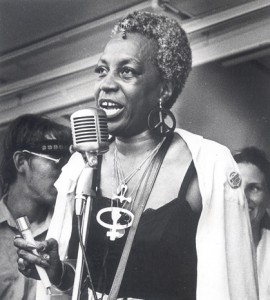Celebrating Black History Month: A Profile of Feminist Florynce Kennedy

In honor of Black History Month, Humanist Network News will be featuring a profile of a prominent black humanist or atheist in history. This profile originally appeared in the September/October 2012 issue of The Humanist.
Florynce Kennedy (1916-2000)
“You’ve got to rattle your cage door. You’ve got to let them know that you’re in there, and that you want out. Make noise. Cause trouble. You may not win right away, but you’ll sure have a lot more fun.” –Florynce Kennedy
An unconventional civil rights lawyer and feminist, Florynce Rae Kennedy was born on February 11, 1916, to Zella and Wiley Kennedy. Her father was a porter and waiter who later owned a taxi service and, other than his brief encounter with the Ku Klux Klan, was able to provide a secure childhood for his children in Kansas City, Missouri. “Our parents had us so convinced we were precious that by the time I found out I was nothing, it was already too late,” Kennedy said. “I knew I was something.”
In 1934 Kennedy graduated with high honors from Lincoln High School, but instead of going to college, she opened a hat shop with her sister and worked odd jobs, including singing on a radio show. She later organized a boycott against a local bottling facility after it refused to hire black drivers, an event that sparked her fervor for social justice.
After her mother died from cancer in 1942, Kennedy moved with her sister Grayce to New York City and enrolled in the pre-law program at Columbia University in 1944, graduating with honors four years later. True to her personality, she resisted encouragement to become a teacher and instead applied to Columbia Law School in 1948. At first she was denied admission (she later wrote that the associate dean had told her it wasn’t because she was black, but because she was a woman), however Kennedy threatened to sue and was admitted. In 1951 she became only the second African-American woman to graduate from Columbia. She passed the New York Bar in 1952 and opened her own practice in 1954.
An interesting departure from Kennedy’s sovereign nature was her marriage to Charles Dudley Rye in 1957, a Welsh writer ten years her junior. The marriage was short-lived, as Kennedy grew tired of nuptial restrictions and of her husband’s alcoholism. He died shortly after the divorce and the couple had no children.
Civil rights activists, black libertarians, the estates of jazz greats Billie Holiday and Charlie Parker—Kennedy represented these clients and more. The bigotry she faced in the courts, however, caused her to doubt whether practicing law could affect social change, a concern she outlined in her 1976 autobiography Color Me Flo: My Hard Life and Good Times. Still, Kennedy persevered. In her signature cowboy hat and sunglasses, she participated in anti-Vietnam War programs and picketed big businesses. In 1966 she created the Media Workshop to combat discrimination in the media. She encouraged black and white women to fight oppression together, often working with Gloria Steinem.
In addition to the Women’s Political Caucus and the National Black Feminist Organization, Kennedy started the national Feminist Party in 1971, which nominated Representative Shirley Chisholm, the first black woman elected to Congress, for president. She even challenged the Roman Catholic Church’s campaign against abortion, insisting the church had violated the Constitution’s separation of church and state. “It’s interesting to speculate how it developed that in two of the most anti-feminist institutions, the church and the law court, the men are wearing the dresses,” Kennedy said.
Kennedy flourished as a lecturer, cable TV host—“The Flo Kennedy Show” ran from 1978 to 1995—and director of consumer rights organizations before her health declined. She spent her later years in a wheelchair and, on December 22, 2000, she died in her Manhattan apartment at the age of eighty-four.
Never content with complacency, Flo Kennedy brazenly advocated for oppressed human beings of all kinds. And she was never apologetic. “I’m just a loud-mouthed middle-aged colored lady with a fused spine and three feet of intestines missing and a lot of people think I’m crazy. Maybe you do too, but I never stop to wonder why I’m not like other people. The mystery to me is why more people aren’t like me.”
